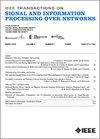Personalized Graph Federated Learning With Differential Privacy
IF 3
3区 计算机科学
Q2 ENGINEERING, ELECTRICAL & ELECTRONIC
IEEE Transactions on Signal and Information Processing over Networks
Pub Date : 2023-10-23
DOI:10.1109/TSIPN.2023.3325963
引用次数: 0
Abstract
This paper presents a personalized graph federated learning (PGFL) framework in which distributedly connected servers and their respective edge devices collaboratively learn device or cluster-specific models while maintaining the privacy of every individual device. The proposed approach exploits similarities among different models to provide a more relevant experience for each device, even in situations with diverse data distributions and disproportionate datasets. Furthermore, to ensure a secure and efficient approach to collaborative personalized learning, we study a variant of the PGFL implementation that utilizes differential privacy, specifically zero-concentrated differential privacy, where a noise sequence perturbs model exchanges. Our mathematical analysis shows that the proposed privacy-preserving PGFL algorithm converges to the optimal cluster-specific solution for each cluster in linear time. It also reveals that exploiting similarities among clusters could lead to an alternative output whose distance to the original solution is bounded and that this bound can be adjusted by modifying the algorithm's hyperparameters. Further, our analysis shows that the algorithm ensures local differential privacy for all clients in terms of zero-concentrated differential privacy. Finally, the effectiveness of the proposed PGFL algorithm is showcased through numerical experiments conducted in the context of regression and classification tasks using some of the National Institute of Standards and Technology's (NIST's) datasets, namely, MNIST, and MedMNIST.具有差分隐私的个性化图联邦学习
本文提出了一种个性化的图形联邦学习(PGFL)框架,在该框架中,分布式连接的服务器及其各自的边缘设备协同学习特定于设备或集群的模型,同时保持每个单独设备的隐私。提出的方法利用不同模型之间的相似性,为每个设备提供更相关的体验,即使在不同的数据分布和不成比例的数据集的情况下也是如此。此外,为了确保安全有效的协作个性化学习方法,我们研究了PGFL实现的一种变体,该变体利用差分隐私,特别是零集中差分隐私,其中噪声序列干扰模型交换。数学分析表明,所提出的保护隐私的PGFL算法在线性时间内收敛于每个聚类的最优特定于聚类的解。它还揭示了利用聚类之间的相似性可能导致替代输出,其与原始解的距离是有界的,并且可以通过修改算法的超参数来调整该界限。此外,我们的分析表明,该算法在零集中差分隐私方面确保了所有客户端的局部差分隐私。最后,通过使用美国国家标准与技术研究院(NIST)的一些数据集(即MNIST和MedMNIST)在回归和分类任务背景下进行的数值实验,展示了所提出的PGFL算法的有效性。
本文章由计算机程序翻译,如有差异,请以英文原文为准。
求助全文
约1分钟内获得全文
求助全文
来源期刊

IEEE Transactions on Signal and Information Processing over Networks
Computer Science-Computer Networks and Communications
CiteScore
5.80
自引率
12.50%
发文量
56
期刊介绍:
The IEEE Transactions on Signal and Information Processing over Networks publishes high-quality papers that extend the classical notions of processing of signals defined over vector spaces (e.g. time and space) to processing of signals and information (data) defined over networks, potentially dynamically varying. In signal processing over networks, the topology of the network may define structural relationships in the data, or may constrain processing of the data. Topics include distributed algorithms for filtering, detection, estimation, adaptation and learning, model selection, data fusion, and diffusion or evolution of information over such networks, and applications of distributed signal processing.
 求助内容:
求助内容: 应助结果提醒方式:
应助结果提醒方式:


